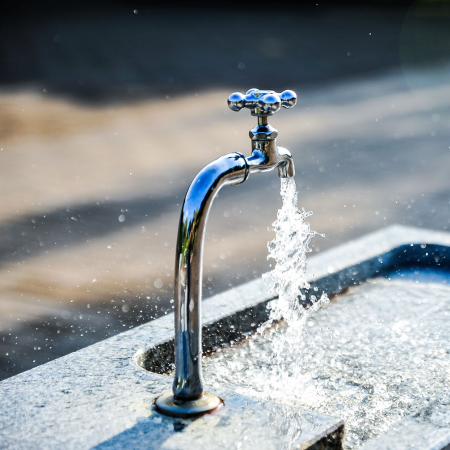
With broad bipartisan support, last week, the Senate passed the Drinking Water and Wastewater Infrastructure Act (S. 914) by a vote of 89-2. The comprehensive bill, which NLC supported, provides $35 billion over five years in federal financing and funding to address our nation’s water infrastructure needs.
Passage of the bipartisan bill comes at a time when infrastructure negotiations in Washington are heating up and work is being done to put together packages around transportation, broadband and workforce development – all NLC priorities for Building Sustainable and Resilient Infrastructure.
Sponsored by Sen. Tammy Duckworth (D-IL), along with Senate Environment and Public Works Chairman Sen. Tom Carper (D-DE) and Ranking Member Sen. Shelley Moore Capito (R-WV), and nearly a dozen other bipartisan committee lawmakers, the bill demonstrates a strong commitment and recognition of the need to invest in our nation’s drinking water and wastewater infrastructure.
Key Provisions for Local Governments
- Reauthorizes and increases the Clean Water State Revolving Fund and Drinking Water State Revolving Fund to $3.25 billion each annually over five years, for a reauthorization of $14.65 billion each—for the first time giving equal authorization to each program.
- Reauthorizes the Water Infrastructure Finance and Innovation Act (WIFIA) at $50 million annually for five years.
- Codifies an existing 10 percent state set aside from the Clean Water State Revolving Fund that provides additional assistance to disadvantaged communities. States are allowed to spend up to 30 percent of their total allocation on these communities.
- Increases the minimum set aside from the Drinking Water State Revolving Fund states must use to provide additional subsidies to disadvantaged communities from six percent to 12 percent. States are allowed to use up to 35 percent of their total allocation on these communities.
- Increases the grant authorization for the existing small and disadvantaged communities program to $510 million over five years and creates a new $250 million over five years competitive grant program for states based on the prevalence of underserved communities.
- Provides grants to reduce lead in drinking water – $500 million over five years for the Lead Reduction Grant program; $250 million over five years for Voluntary Lead Testing in Schools; and creates a new Lead Inventorying Utilization Grant at $10 million available until expended.
- Provides grants for water infrastructure resiliency and sustainability programs for communities to increase the resiliency or adaptability of water systems to natural hazards, including extreme weather events due to climate change at a combined total of $500 million over five years for drinking water and wastewater. This includes specific grants for small and disadvantaged communities ($25 million annually) and medium and large systems ($50 million annually) for drinking water resiliency and grants to communities of all sizes looking to fortify their wastewater systems from the impacts of climate change ($25 million annually).
- Authorizes $550 million annually for five years in new grant programs for nonprofit organizations and public treatment works to help eligible households connect to existing drinking water or wastewater infrastructure or install or upgrade decentralized wastewater systems.
- Provides grants for new and emerging technologies – $50 million over five years for advanced drinking water technology grants to address cybersecurity vulnerabilities or enhance treatment, monitoring, affordability, efficiency, or safety of the drinking water; $75 million over five years for a water data sharing pilot program; $50 million over five years for stormwater control infrastructure projects; and $100 million over five years for a wastewater efficiency grant pilot program to carry out projects that create or improve waste-to-energy systems.
- $1.4 billion over five years for the sewer overflow and stormwater reuse municipal grant program to help communities to better manage their wet weather flows and invest in green infrastructure and water and energy efficiency projects.
- $25 million over five years for water infrastructure and workforce investment grants to address recruitment, training and retention challenges facing the water and wastewater utility workforce.
In the House, water infrastructure jurisdiction is split between the Transportation and Infrastructure Committee (wastewater) and the Energy and Commerce Committee (drinking water). Each committee is working on several bills, which NLC supports, that ultimately could be conferenced with the Senate-passed bill or included in a comprehensive infrastructure package.
These bills include the bipartisan Water Quality Protection and Job Creation Act (H.R. 1915), which would authorize $50 billion in wastewater infrastructure investments over the next five years, including $40 billion over five years for the Clean Water State Revolving Fund; $2 billion over five years for the sewer overflow control grant program; and $1 billion in grants over five years to municipalities to implement treatment standards for per- and polyfluoroalkyl substances (PFAS) and other emerging contaminants.
Additionally, the LIFT America Act (H.R. 1848), would authorize a $51.6 billion investment in our nation’s drink water infrastructure over the next five years, including $25 billion through the Drinking Water State Revolving Fund, $4.5 billion for grants to address lead pipe replacement and $2.5 billion to address PFAS drinking water contamination. H.R. 1848 is a broad package covering other infrastructure areas within the Energy and Commerce jurisdiction, including broadband and clean energy.
NLC looks forward to working with Congressional leaders to move legislation forward that addresses our nation’s clean water and drinking water infrastructure needs.









